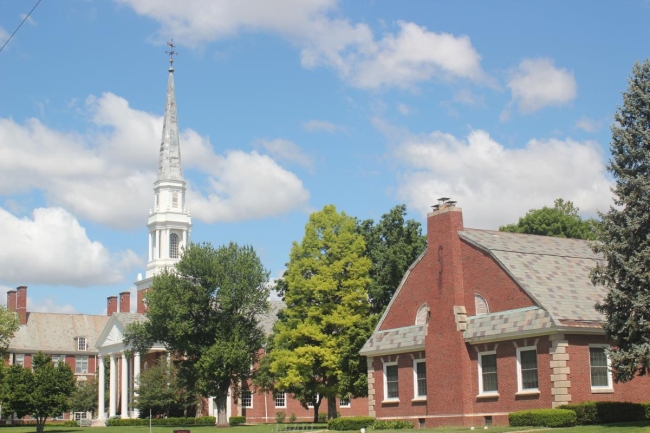You have /5 articles left.
Sign up for a free account or log in.

MacMurray College's campus
MacMurray College
Two colleges -- the San Francisco Art Institute and MacMurray College -- announced last week they will suspend admissions or close entirely at the end of the semester, adding to a growing list of institutions that are halting operations amid the new coronavirus outbreak.
As with all college closures and wind-downs, the details of each case are different. But each can provide additional insight into how at-risk institutions will be forced to react to a suddenly stressed environment.
SFAI will not admit any new students and is considering suspending regular courses and degree programs at the end of the spring semester. That decision will be made in coming weeks, said Pam Rorke Levy, chair of the institute's Board of Trustees.
The institute had been in talks with nearby universities about a possible merger deal, but those negotiations fell apart when the coronavirus outbreak spread to the West Coast and college leaders were pulled back to focusing on their respective campuses.
“Everybody in that kind of environment becomes much more risk averse,” Levy said. “Do they want to take on another institution that has cash-flow problems and help us at a time when they may have unanticipated financial challenges of their own?”
The coronavirus-caused disruption of business as usual may have changed SFAI’s fate. Levy said that without it, a deal could have been reached early enough to keep the institute operating in some form. Now, Levy hopes the institute will find a way to stay afloat until merger talks can resume.
“We’re going to be open in some form,” Levy said. “The question is, in what form? Is it going to be all of our programs? Is it going to be a subset of them? Is it going to be skeleton staff hanging on tight until the epidemic passes?”
She suggested the institute could leverage its property and assets -- including a Diego Rivera painting appraised at $50 million -- in order to weather the current financial challenges.
SFAI is one of the first higher education institutions to wind down operations while specifically citing the coronavirus outbreak. Others are expected to follow. Despite the board’s insistence that the institute will remain open, many news outlets -- including The New York Times and The Architect’s Newspaper -- have described SFAI’s recent moves as antecedent to closure.
Suspending admissions is often an indicator of an impending closure. Last month Notre Dame de Namur University, also located in the San Francisco Bay Area, announced it would no longer admit new students in an effort to stave off a potential closure.
Michael Horn, co-founder of the Christensen Institute, said that the new coronavirus will “hasten the demise of many schools that are on the brink and struggling” for two reasons. First, already-declining enrollments are likely to fall even further. Second, the oncoming economic disruption will hurt colleges’ bottom lines and impact students’ ability to pay tuition and fees.
“Even if they attract students -- if they're tuition dependent -- whatever the financial aid packages they were offering won’t be enough,” Horn said.
Asked what types of colleges will be most affected by the outbreak, Horn laid out a list: private, liberal arts, religious institutions, fine arts and music colleges, and colleges with high tuition discount rates and low endowments.
MacMurray College -- a small liberal arts college in Jacksonville, Ill. -- checks several of the boxes Horn listed. The college announced Friday that it would close at the end of the spring semester. The coronavirus outbreak and resulting economic disruption “complicated MacMurray’s financial condition” but were not primary reasons for the closure, according to a statement.
MacMurray's leadership team worked to develop a sustainable financial model for more than a year. The model would have included expanding the college's professional degree programs and working to admit more nontraditional students.
“Despite our best efforts, we were unable to secure the capital to fund a viable path forward,” Charles O'Connell, Board of Trustees chair at MacMurray, said in a statement. “We deeply regret this decision and are sorry for the disruption and disappointment it will have for everyone in the Mac Family. But the reality is this: we were left with no alternative and had only one responsible option.”
The college has negotiated transfer agreements for students with Blackburn College, Eureka College, Greenville University, Illinois College, McKendree University, Millikin University and Monmouth College.
Asked why the board waited until spring to vote to close the college, President Beverly Rodgers said the vote followed "time-consuming analysis" of other potential options.
"The Board pursued and prepared several different scenarios for more than a year, including merger with another college, financial remedies, development of a strategic plan to reshape MacMurray’s business and academic model, and closure," she wrote in an email. "After that extensive process, it became clear MacMurray could not secure the capital needed to keep the college open and had no viable financial path forward."
Most of MacMurray’s 101 employees will be terminated on May 25.
Jamie Bolker, an assistant professor of composition at MacMurray, tweeted about the college’s closure. She joined the faculty in November. She has not been told yet whether she and other faculty will receive severance pay.
“They told me in the interview that the school had financial problems but I had no idea the true magnitude, even after doing some research,” she wrote in an email. “I probably wouldn't have even applied for the job had I known I would be working there for only five months before they closed.”








